Renting, it’s not just about the advertised price, hidden costs lurk beneath the surface, like application fees that can range from a modest $25 to a hefty $100 or more, a gamble you take with each property you consider.
You might find yourself applying to multiple places, a necessity in a competitive market, with each application chipping away at your budget and each non-refundable fee adding to the total.
Then comes the credit check, often bundled with the application fee, another layer in this game with prices anywhere from $20-$50, and they might use a third party making it more expensive.
It’s a gauntlet of small expenses that can quickly add up to a significant sum.
Consider this: applying to three places, with a $50 application fee each, means you’ve already spent $150 before securing a rental.
It’s a business, with costs that fall squarely on you.
You see that dream place, and you need to be prepared for this financial hurdle, and you might need to apply for many places just to secure one.
Then there is the security deposit, not just a placeholder, but a serious chunk of change, often equal to one or even two months’ rent.
It is a major hurdle and it’s an amount you need to budget for.
Landlords are holding onto that money, and getting it back can be a fight.
The deposit is there for damages, for cleaning, and for unpaid rent.
It’s not just a formality, so you should document the state of the property before moving in. There is a checklist for this purpose.
You need to be aware that not all things are considered wear and tear.
The paint may fade and the carpets may wear out, but holes on the wall and stains on the carpets will be deducted from your deposit.
You have to be diligent with this because it is money you worked hard for.
Moving expenses are another layer of costs that can surprise you if you are not prepared.
It’s not just about renting the truck, which comes with its own costs such as mileage, insurance, and gas.
There are other things that can add up quickly, like packing supplies that are not free, and the hidden cost of time off work.
The time you spend packing and loading the truck is time you are not working.
It’s opportunity cost that you should not forget when budgeting.
Maybe you need to hire movers, but that’s an additional expense that you have to consider.
You also need to set up utilities, another expense that might surprise you. The setup is not as simple as you might think.
There are deposits you have to pay and setup fees that add to the costs.
And then the variable costs of the bills themselves, the shock of the first bill can be unexpected especially if you move to a place that requires high consumption of electricity.
Late payment penalties also exist if you don’t pay on time.
So it’s another thing you should keep track of to avoid the extra expenses.
Then you need Renter’s insurance.
It’s an important layer of protection, the cost may seem unnecessary, but it protects your stuff from theft, fire, and water damage.
The landlord is not responsible for your personal belongings, which makes this insurance essential.
There are different types of policies, you have to choose between cash value and replacement cost.
There are also deductibles, the higher the deductible, the lower your monthly cost, so you must consider what works best for you.
If you have a pet, there are additional costs such as non-refundable pet deposits, monthly pet rent, and potential costs for damage to the property.
This can add to the already expensive cost of renting.
You must be ready for this because if your pet destroys the property you will have to pay for it.
And finally, parking.
It’s another hidden cost that you might not think about, especially in urban areas. Assigned spots can be costly.
Street parking can be difficult and come with fines and restrictions.
Garage parking is another option but it can add to your monthly expense.
Also, guest parking is usually very limited and restricted.
The road to renting has many hidden costs, prepare yourself.
The Application Fees Game
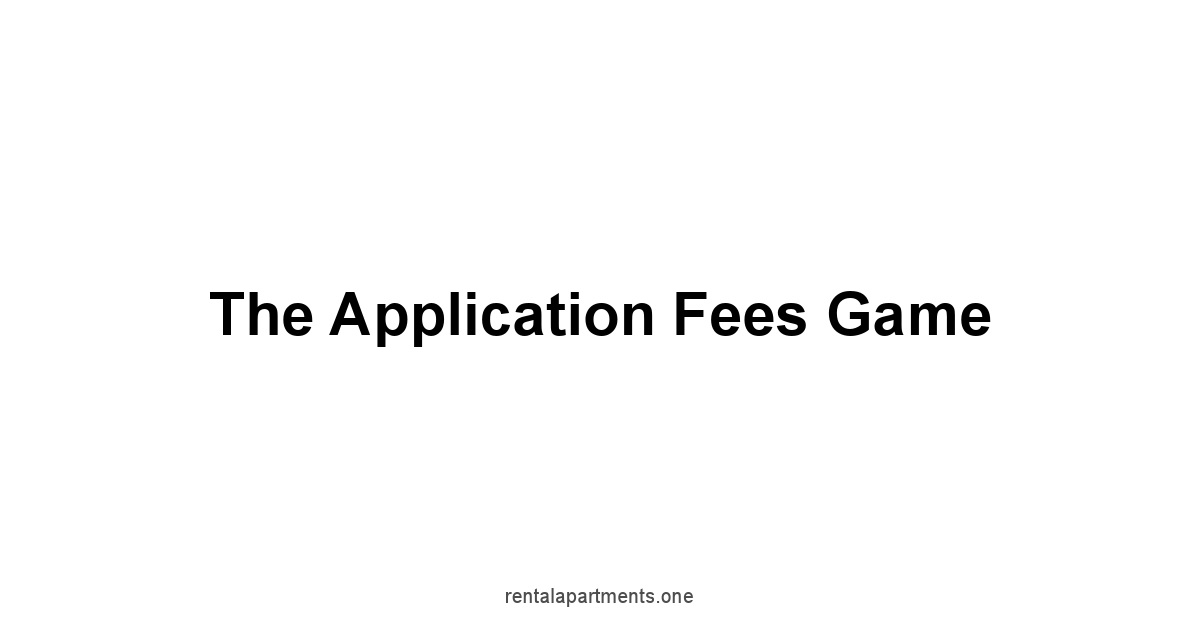
Applying for a place, it’s a process.
They want to know you, your history, how much you make. Before you even get a key, they ask for money.
It’s the cost of doing business, they say, but it’s a cost that falls on you, the renter.
The application fees game is real, and it’s something you need to navigate with your eyes wide open and a budget ready to be spent before you even find the place you might call home.
It’s not just one fee, it’s a collection, each one adding up, each one eating into your budget.
They get you coming and going, and it’s part of the game, but you can play it smart.
It’s a series of small hits to your wallet that can feel as draining as a big expense.
You need to be prepared for these fees when you’re house hunting, otherwise, the dream of a new place could leave you in the red before you’ve even signed the lease.
Each landlord does it differently, but the results are the same.
These fees are non-refundable and the amounts vary greatly and are also dependent on where you are trying to rent.
The Cost of Applying: It Adds Up
Each application is a gamble.
You pay a fee, hoping the place is right for you and that the landlord approves your application.
The money you spend on application fees doesn’t go towards your rent or your security deposit.
It’s just a payment for them to consider you as a renter.
These fees aren’t standard, they can vary from $25 to $100 or even more, depending on the location and the rental market and can quickly add up especially if you are applying to multiple properties.
It’s a business, and for them, it’s a way of weeding out people and making money.
Think of it this way: if you apply to three places, each with a $50 application fee, you’ve already spent $150 before even securing a rental.
The actual cost of renting keeps increasing even before you get the keys.
It’s a cost many people overlook until they are in the thick of things.
Applying for a place has become a business of its own, with everyone trying to get a piece of the pie. Be aware of this and prepare accordingly.
- Typical Application Fee Range: $25-$100+
- Factors Influencing the Fee: Location, rental market, property type
- Average Number of Applications Per Person: 2-4
- Potential Total Cost: $50-$400+ before you get the key
Credit Check Fees: Know What You’re Paying For
The credit check is a standard part of the application process.
The landlord wants to know if you pay your bills on time.
It’s a snapshot of your financial history, and they charge you for the privilege of looking at it.
This is another cost that many don’t budget for, but it’s an essential step for renting.
Landlords use your credit score to determine how likely you are to pay your rent on time. It’s a necessary evil in the rental game.
These credit check fees are not always the same price and they can sometimes be bundled with the application fee.
It’s crucial to find out what the credit check is going to cost you so that you can factor it into your budget and avoid any surprises.
These checks cost landlords money, but that cost passes down to you, and if they use a 3rd party service, that could potentially be more expensive for you as the renter. The price can vary based on the service they use.
You are not just paying for the report but also the process of getting that report for them.
- Typical Credit Check Fee: $20-$50
- Bundled or Separate: Can be included in the application fee or charged separately
- Third-Party Services: Some landlords use third-party services that may charge more
- Credit Score Impact: Your credit score is checked, and it will affect approval chances
Application Redundancy: Why Apply Multiple Times?
Applying to multiple places feels like a necessity when the rental market is tight.
The same rules apply: each application costs money, and if you are trying to get into the place you want, it may require you applying to multiple properties.
But, every time you do, you risk spending money without the guarantee of getting a place. It’s a risk, but it’s sometimes necessary.
However, you should try to avoid applying for properties that you know you won’t like to save money in the long run.
The problem with applying to multiple places is that you may end up getting approved for more than one.
If you do end up getting approved for more than one, you will have to choose one which leaves the other application fees a total waste.
Be smart about where you are applying and make sure you want the place before you pay anything. This is an area where many renters lose money.
There is no way to recoup that money and it’s just something you have to take as a loss.
- Reason for Multiple Applications: Competitive rental market
- Potential Cost Increase: Each application is a fee
- Risk of Redundancy: You might be approved for multiple places
- Smart Strategy: Apply for places you truly want
Security Deposits: More Than Just a Placeholder
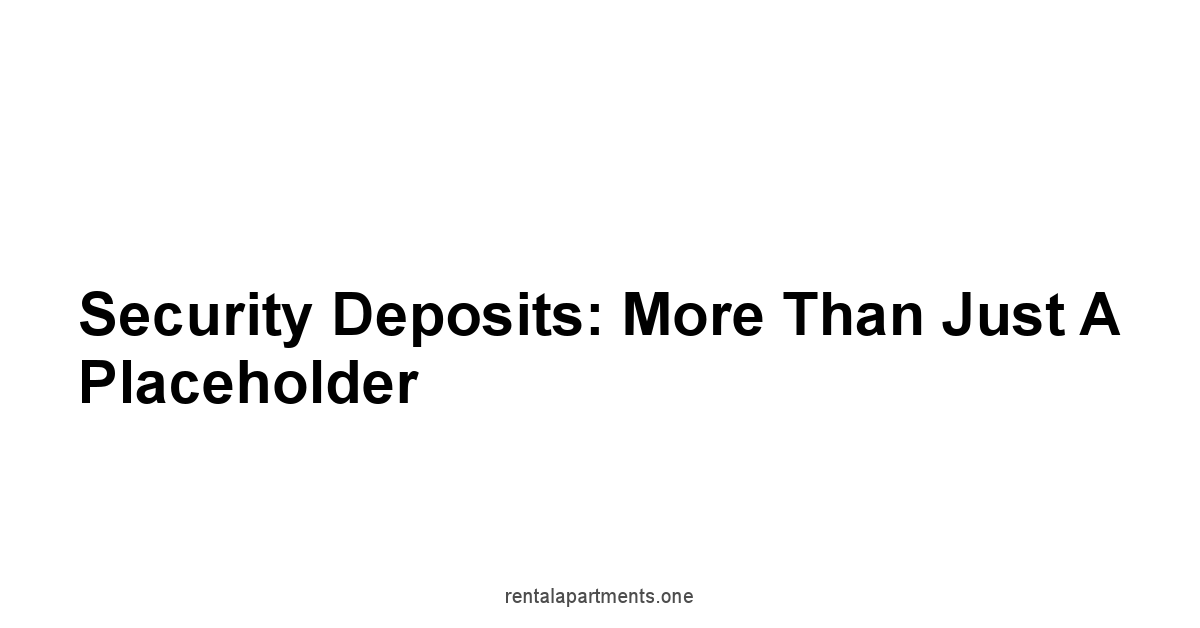
The security deposit, it’s a sum you hand over at the beginning of your lease.
It’s supposed to cover any damages you cause beyond normal wear and tear.
However, it often feels like a non-refundable payment.
It’s a big chunk of change, sometimes equal to one or two months’ rent.
It’s more than just a formality, it’s a significant expense that you need to budget for.
It’s also an expense that you need to fight for to get back when you leave. It is not just a formality.
The deposit is more than a guarantee, it’s a statement of your financial responsibility and an acknowledgement that you are liable for the property you are renting.
Landlords hold onto it, and getting it back can be a struggle.
This deposit is not always for damages, it can also be used for cleaning or unpaid rent.
Understand what this deposit is for and how it can be deducted to avoid any surprises in the future.
It’s important that the condition of the place when you move in is documented.
The Full Cost of Securing a Rental
The security deposit is a substantial upfront cost.
You need that money to secure a place, and that cash won’t be readily available for other things.
It’s a barrier to entry, especially for those on a tight budget and it can be a major obstacle for many.
It often ends up being the same amount or even higher than the first month’s rent, which can be quite shocking for first time renters.
There are situations where it’s more than the first month’s rent, so be prepared for it.
The cost can vary greatly, depending on the landlord, the location, and the property.
For some, this could be a month’s rent, for others, it could be two.
It’s a big hit, and it can be difficult to recover if you face any financial issues. Don’t be caught off guard by the deposit amount.
It’s a reality of renting, and the higher the rent, the higher the deposit usually is. Prepare yourself.
This is the main financial hurdle to get over when you’re renting.
- Standard Deposit: One to two months’ rent
- Factors Affecting Deposit Amount: Location, property type
- Financial Impact: Large upfront cost, can be a barrier
- Budgeting: Prepare for this when planning
Understanding What’s Deductible
The security deposit is not just a lump sum that gets returned to you.
It’s a sum that can be used to pay for the damages you caused during your stay.
What’s considered “damage” and what’s “normal wear and tear” is not always so clear.
Landlords can deduct money from your deposit for various reasons.
They may say that the marks on the walls are not normal wear and tear.
They will have a checklist and they will try to charge you for anything that is not on that list from when you moved in.
Normal wear and tear is expected: the paint fades and the carpet gets worn out, but you could get charged for any holes in the walls or stains on the carpet.
The landlord has a right to deduct from that security deposit if you’ve done any damage to the property.
The important thing to remember is to document the condition of the rental when you move in, so you don’t get blamed for the damages caused by someone else.
Know what the landlord can take money from, and try to be smart and maintain the property to the best of your ability.
- Normal Wear and Tear: Faded paint, worn carpets
- Deductible Damages: Holes in walls, stains, broken fixtures
- Landlord’s Discretion: They decide what they will charge you
- Documenting Conditions: Take photos and videos upon move-in
Fighting for Your Deposit Back: The Reality
Getting your security deposit back is not always straightforward.
Landlords are known to hold on to as much of your deposit as they can.
They sometimes give you long explanations or lists of what they spent the money on.
The process of getting your deposit back can be a battle, and you need to be ready for it.
You need to know the laws in your state to fight for your deposit back.
Sometimes, you may need to fight back to get what’s rightfully yours.
It involves keeping records, negotiating, and sometimes, even legal actions.
Many renters lose money because they don’t know their rights or they give up the fight.
Be aware of the laws, do your research, and don’t let them keep your money if you deserve it back.
The deposit isn’t just a placeholder and it’s real money.
So treat it like that, and make sure you get it back.
- Challenges in Getting Deposit Back: Landlords often try to deduct as much as they can
- Importance of Documentation: Photos, videos, and checklists are crucial
- Legal Rights: Know your local laws regarding security deposits
- Negotiation Skills: Sometimes you need to negotiate to get your money back
The Importance of a Walk-Through Checklist
A walk-through checklist is a critical step to protect your security deposit.
It’s an inventory of the condition of the rental when you move in.
Go through every room and list everything and document it by taking photos and videos.
Use this as your initial document and then you can use it later when you are moving out and they try to deduct money from your security deposit.
You have to be thorough with this process as it’s the only way to protect yourself.
The checklist helps you compare the property’s condition when you move in versus when you move out.
The more thorough the checklist, the better protected you are.
Ensure that the landlord signs it as well and you have a copy to keep for yourself.
When you move out, use this as a basis to get your deposit back.
This checklist can be your main piece of evidence if you end up going to court.
- Purpose of the Checklist: Document the initial condition of the property
- Detailed Inventory: List all existing damages and conditions
- Landlord’s Signature: Ensure the landlord also signs the checklist
- Evidence: Use checklist as evidence when moving out
Moving Expenses: The Real Burden
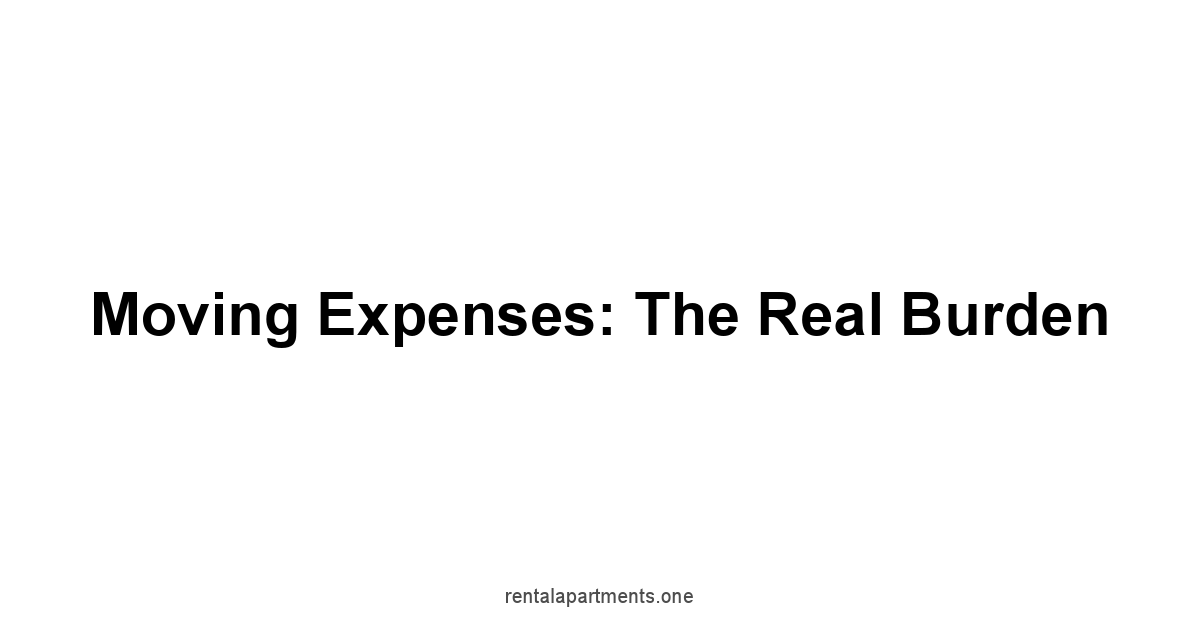
Moving to a new place, it’s not just about the deposit and the first month’s rent.
There are moving expenses, which can be a bigger burden than you might think.
You have to pack all your belongings, and haul them to a new place. That’s expensive in itself.
These moving expenses, if not planned, can leave you financially drained and this is not just about the truck and the gas.
It’s the boxes, tape, labor and time you have to spend on it.
Moving is more than just getting your stuff from point A to point B.
There are multiple layers of costs that add up, and they’re easy to underestimate.
It’s important to have a moving budget that addresses every single possible expense that could come up.
It can involve paying movers, renting trucks, purchasing packing supplies, and the hidden cost of your time.
All this needs to be factored in, so you don’t end up spending more than you have.
The Cost of a Moving Truck: It’s Bigger Than You Think
Renting a moving truck sounds simple, but it’s not as straightforward as you think.
The truck’s size matters, and so does the distance you’re moving.
One way rentals usually cost more than local rentals, and if you are moving long distances, it can become even more expensive. There are also rental add-ons and hidden fees. You may need to purchase insurance for the truck.
Truck rentals are not just about the base rate, there are extra charges for mileage, insurance, and gas, and all of these add up very quickly and unexpectedly.
Be aware of the total costs when you are booking that truck.
You need to plan properly and understand exactly how much it is going to cost you before you commit. There are also different truck sizes.
You need to pick the right one to fit all of your belongings.
If you choose a small truck, you might end up having to take multiple trips, which would cost you more money.
- Rental Fees: Base rate, mileage charges, and rental insurance
- Truck Size: Depends on the quantity of belongings
- Distance: One way rentals usually more expensive than local rentals
- Hidden Fees: Gas, add-ons and insurance costs
Packing Material Costs: Boxes and Tape are not Free
Packing materials, things like boxes and tape, are things that you will need if you are planning to move and they are not free. These costs are not huge but they do add up.
Boxes may seem cheap, but if you are not careful, the cost can quickly escalate, and you could end up spending a lot of money if you don’t have a strategy.
You need more than just boxes and tape, there is also bubble wrap, packing paper, markers, labels. You need all of it.
Finding free boxes is one way to cut the costs, but you still have to factor in the cost of all other necessary materials.
The best way to manage the cost is to start gathering boxes way ahead of the moving date.
If you wait till the last minute, you will probably end up buying boxes at retail prices. Always plan ahead.
This is not something you want to leave for the last minute, because the cost could be much higher.
It’s a necessary cost, but it’s something you can manage and reduce if you plan properly.
- Essential Supplies: Boxes, tape, bubble wrap, and packing paper
- Cost of New Boxes: Prices add up quickly
- Free Alternatives: Check local grocery stores or online resources
- Budgeting: Don’t underestimate these costs
Time is Money: Consider Your Labor Costs
Your time is valuable, and moving takes a lot of it.
If you spend your time packing and moving your stuff, that is time you could spend working, which is money you have lost.
This is what some people don’t consider when thinking of moving expenses.
Time spent packing boxes and loading the truck is time you are not doing something else. Don’t forget to account for that cost.
If you are taking time off work, it can cost you in lost wages.
You need to factor in this cost if you can’t work due to moving. This can be the biggest hidden cost. Your time is money.
If you don’t want to move your stuff, and want someone else to do it, then you would be spending more money.
Either way, the cost is real, either as lost wages or paying movers.
The time spent moving is time you are not getting paid for.
- Lost Wages: Consider the value of your time when moving
- Time Off Work: Factor in costs of taking time off
- Opportunity Cost: What you could be doing instead of moving
- Planning: Manage your time efficiently
Professional Movers: Weighing the Expense
Hiring professional movers is another cost you must consider. They are convenient, but they are also expensive.
They can make the process easier and faster, but they will charge for that convenience.
You need to weigh the costs of labor against your budget.
The cost of professional movers can vary greatly based on the distance, the size of the move, and the company you use.
When considering professional movers, get quotes from multiple companies and compare prices.
Read reviews of different companies, so you know what to expect from their services.
They may seem to be expensive, but the time you save might be worth the cost, especially if you have a lot of stuff or a long move.
It all depends on your budget and how much time you have available.
Plan the process out carefully to make sure you choose the right path.
- Cost Factors: Distance, move size, and moving company
- Price Comparison: Get quotes from multiple movers
- Pros: Convenience and speed
- Cons: High cost
- Decision Factors: Budget vs. time available
Utilities: Budgeting for the Basics
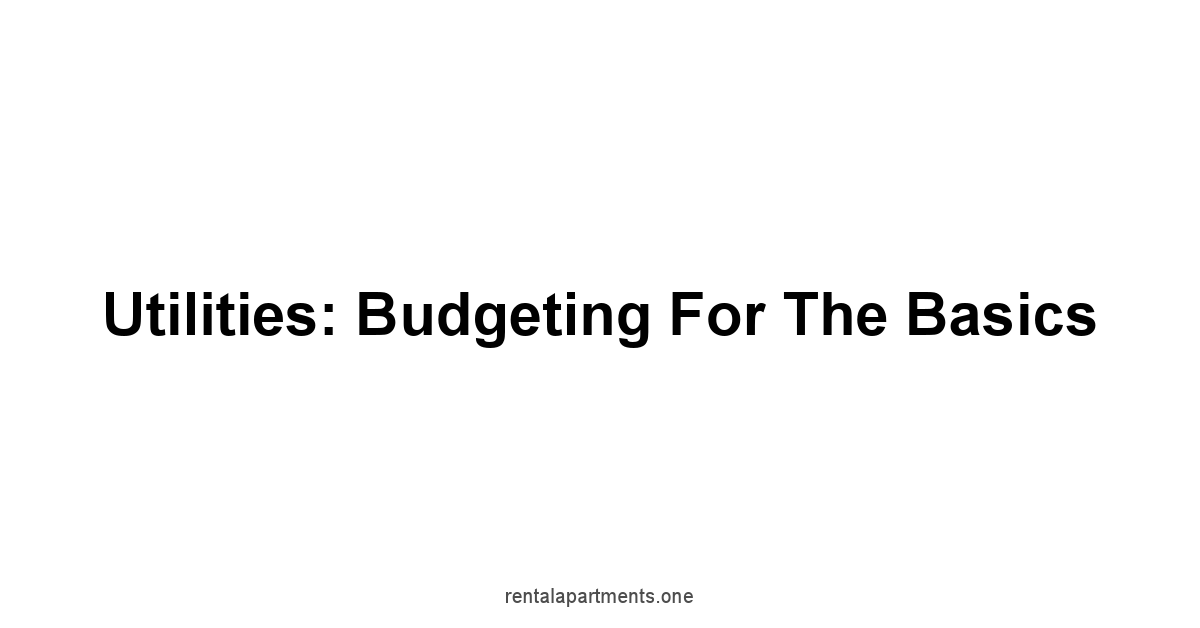
Utilities, it’s a necessity of modern life.
You need electricity to run your lights and appliances, gas to heat your home and cook your food, and water to bathe and clean.
When you move into a new place, you are in charge of setting up and paying for these utilities. This process may seem simple, but it can be tricky.
You should always do your research and plan accordingly.
It is not just the monthly bills you need to consider.
There are also deposits, setup fees, and variable costs based on your consumption.
These fees and costs can add up quickly, which can take you by surprise.
You have to budget for these expenses as well, and you need to do it properly.
It is important to know the average costs in your new area, so you have a general idea of what you will be paying.
Setting up utilities: It’s Not Always Smooth
Setting up utilities is not as simple as making a phone call. It takes time and effort, and things can go wrong.
There could be issues with the setup, waiting times, or even unexpected fees.
Some companies may require you to be present at the property, which may cause you to take time off work.
Don’t think that setting up utilities will be as easy as you think.
The process of setting up utilities varies from place to place.
Some places will require you to set up everything yourself, and others will have everything ready for you.
It is important to be prepared for any issues that might arise.
This is not something that you can leave for the last minute, so do your research and make the calls beforehand to avoid surprises. Planning ahead is always the key.
- Time Required: Can take time and effort
- Setup Fees: Some companies have fees for setting up the account
- Potential Issues: Waiting times, and unexpected issues
- Research: Understand the local setup process

Variable Costs: The Shock of the First Bills
The first few utility bills can be a shock, especially if you are moving to a different climate or a larger space.
The cost of utilities can vary widely based on the season and your consumption. In the winter, you may have higher heating bills. In the summer, you may have higher cooling bills.
Consumption of water depends on your usage, which can increase your costs. The first few bills are difficult to predict.
The best way to manage this is to budget for the higher end of these costs. You have to plan carefully when moving in.
It’s better to overestimate than to underestimate these costs.
Your consumption may vary as well, so you need to keep an eye on how much you are using so you have a general idea of the bills you will be getting.
Keep in mind, these are variable costs, which can change month to month.
- Seasonal Changes: Heating and cooling bills fluctuate
- Consumption: Your usage dictates cost
- First Bills: Difficult to predict
- Budgeting: Plan for potential fluctuations
Deposits for Utility Services: Know Before You Sign
Utility companies may require you to pay a deposit when you set up your service. This is standard practice for first time users.
They do it to protect themselves if you don’t pay your bills.
The deposit is a lump sum you have to pay at the beginning, and that can add to the cost of moving in.
You should research the deposit fees for each provider.
These deposits can be quite significant, and they vary from company to company.
Some companies have a tiered system depending on your credit history.
The deposit is there as a security for them, and it’s something you will have to pay upfront. Do your homework, so you know what to expect.
These deposits are not refundable if you still have active services with them. So, they are not the same as a security deposit.
- Standard Practice: Companies often require a deposit
- Credit Score Impact: Can affect deposit amount
- Variations: Deposit amounts vary by company
- Budgeting: Plan for these upfront costs
Hidden Fees: Late Payment Penalties
Late payment penalties are a hidden cost many renters don’t consider.
These penalties can accumulate and add to your monthly bills if you are late on your payments.
Companies do charge late fees, and the amounts vary.
If you are always late on paying the bills, the penalties will add up and you will be spending a lot more than you had anticipated. You have to keep your payments on time.
There are also other hidden fees to consider, like service fees and processing fees.
The companies may charge for these, even when you pay the full bill on time.
Always read the fine print and the terms and conditions before signing up.
Try to pay on time and set up automatic payments if necessary to avoid any issues. These late fees add up.
You could be paying an extra 10-20 dollars just for late fees.
- Late Payment Fees: Can accumulate and add to bills
- Hidden Costs: Service fees and processing fees
- Terms and Conditions: Read the fine print
- Automatic Payments: Set them up to avoid late fees
Renter’s Insurance: The Protection You Need
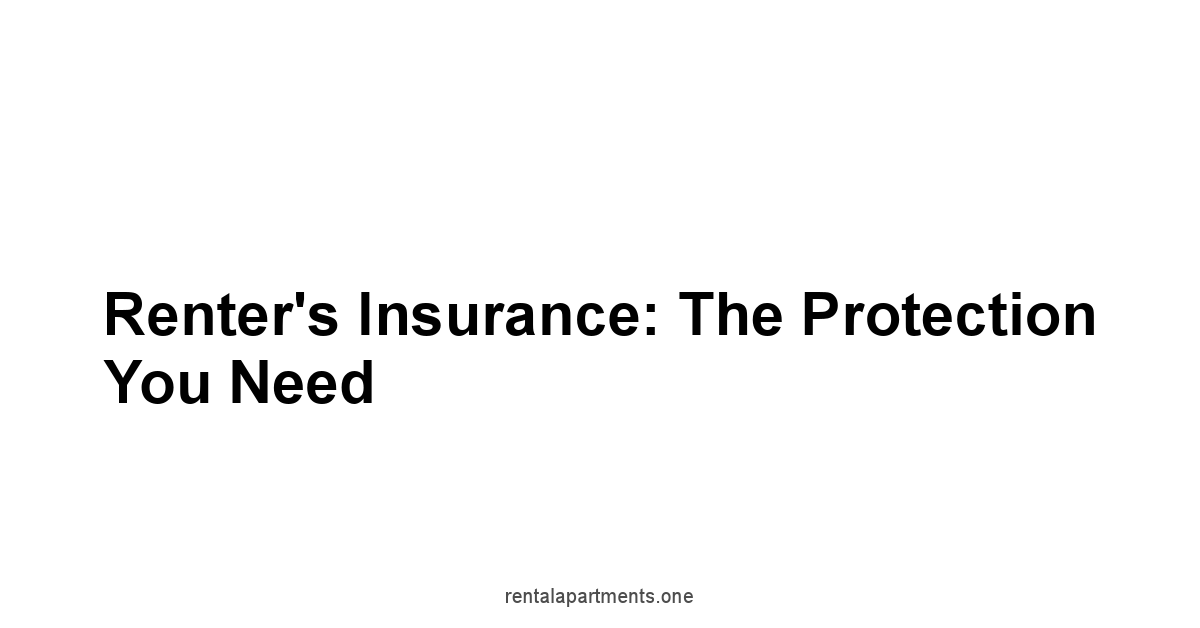
Renter’s insurance, it’s something most people think they don’t need, but it is an important layer of protection.
It is not as exciting as the new apartment, but it is necessary. It protects your belongings in case of damages.
Your landlord’s insurance covers the building, not your personal belongings.
You need your own insurance to cover your stuff and protect yourself.
This cost is something you should plan for as part of the renting process.
Many renters underestimate the importance of this insurance. They think nothing bad will ever happen to them.
But it’s always better to be prepared for the unexpected.
Imagine if a pipe burst and damaged all of your belongings.
You would have to replace all of that out of your own pocket, and that could be very costly. Don’t gamble with your belongings. Always get renter’s insurance.
Coverage You Need: It’s More Important Than You Think
Renter’s insurance covers your belongings in case of theft, fire, water damage, and other disasters, which is essential.
Your landlord’s insurance only covers the building, not your personal property.
If something happens to your stuff, you will have to pay out of your own pocket. That is the importance of renter’s insurance.
It covers your personal belongings, and it also protects you if someone gets hurt on your property and decides to sue you.
The peace of mind you get with renter’s insurance is worth the cost.
The coverage extends to more than just your belongings.
It protects you from certain legal liabilities as well.
You might be held responsible for damages that you are not responsible for.
This is why you need renter’s insurance to protect you.
It’s a small price to pay for all the security and peace of mind.
- Coverage: Protects against theft, fire, and water damage
- Landlord’s Insurance: Only covers the building
- Personal Belongings: Protects your stuff
- Legal Liability: Provides coverage if someone is injured in your property
Different Policies: Choose Wisely
There are different types of policies available for renters, and each one offers a different level of coverage.
You have to research and choose the best policy for your needs.
It can be a bit confusing, but there are two major types of policies.
One policy covers your possessions for the actual cash value.
That means, they will pay what it’s worth at the time of the incident, which takes into account depreciation.
The other policy pays the cost of replacement which is more expensive.
When you’re choosing a policy, consider your needs and budget. A lower price might come with less coverage.
You need to make sure you have a policy that adequately covers the things you own.
Research each company and read reviews before choosing the one that is best for you.
Get multiple quotes to compare the different policies and prices.
Don’t just go with the cheapest one, look at coverage too.
- Actual Cash Value: Pays what the items are worth at the time of the incident
- Replacement Cost: Pays the full replacement price of items
- Policy Comparison: Shop around for best coverage and prices
- Coverage Needs: Make sure it fits your needs
Deductibles: What You Will Pay
A deductible is the amount you will pay out of pocket before your insurance policy will cover the rest.
The higher the deductible, the lower your premium, and vice versa. You need to choose the right deductible for you.
It’s a balance between how much you pay out of pocket if something goes wrong, and how much you pay monthly for the coverage.
If you don’t make any claims, you end up paying a higher premium, which means a higher monthly cost.
The deductible is a major part of your renter’s insurance cost, so you have to understand it and choose the right amount for your budget.
Consider your financial situation and how much you can afford to pay if you have to file a claim.
Don’t just go for the lowest premium because you could end up paying more if an incident happens and you choose a high deductible.
Be aware of the pros and cons and make the right choice for yourself.
- Definition: The amount you pay out of pocket before insurance covers the rest
- Premium and Deductible: Lower deductible equals higher premium, and vice versa
- Budgeting: Balance your monthly costs and potential out of pocket expenses
- Financial Situation: Consider how much you can pay when you make a claim
Avoid a Financial Catastrophe: Be Protected
Renter’s insurance is not a luxury, it’s a necessity for protecting your belongings and your finances.
It can save you from financial ruin if something happens.
Without insurance, you would have to bear the costs of replacing stolen or damaged items, which could cost thousands of dollars.
Being insured provides you with peace of mind and ensures your financial well-being.
Don’t gamble with your financial stability.
The cost of renter’s insurance is often less than the potential costs of replacing everything you own. This is not something to cut corners on.
It’s a necessary cost that protects you from financial loss.
Don’t let a small incident become a financial catastrophe because you didn’t want to spend money on renter’s insurance.
- Financial Security: Avoid financial devastation due to loss or damage
- Cost vs. Benefit: The cost is lower than the potential expense
- Peace of Mind: Knowing you are covered offers peace of mind
- Don’t Gamble: Renter’s insurance is a must have
Pet Fees: Furry Friends Come at a Price
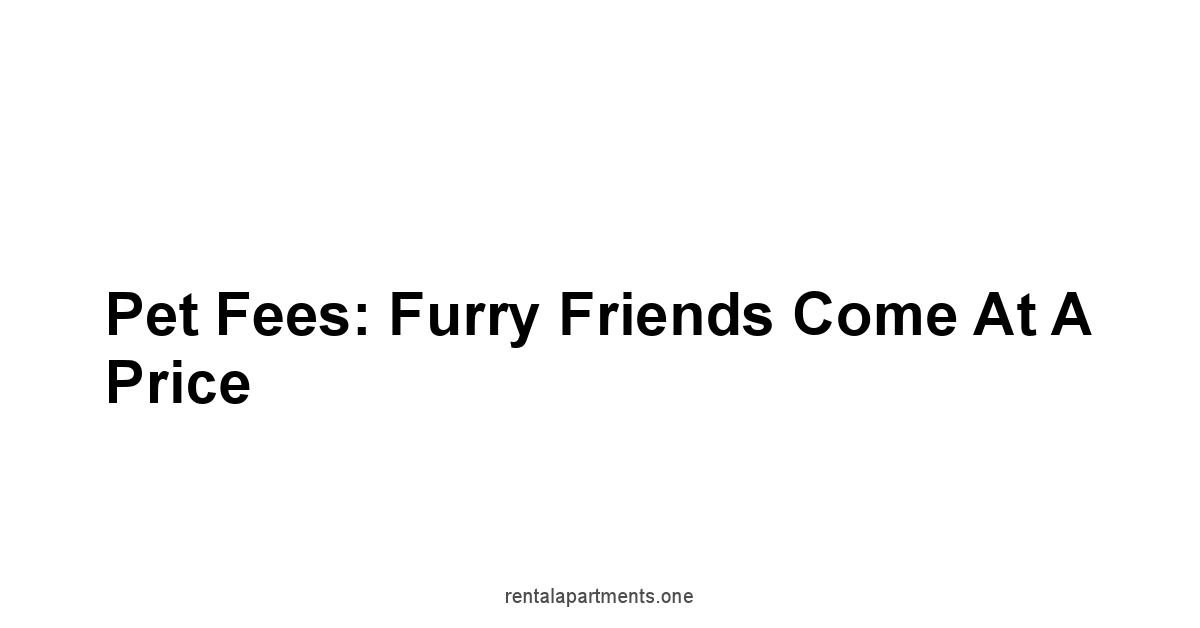
Having a pet, it brings joy to your life, but it also adds another layer of cost to your rental.
Landlords often charge extra for pets, and it’s not just a one time fee.
It is a business, and the landlord has to deal with things like noise, damages, and potential cleaning, and they want to be compensated for that.
You need to plan ahead for the costs if you are planning on bringing a pet with you.
Pet fees can range from pet deposits to monthly pet rent, and it can add a significant amount to your rental costs.
Landlords also impose restrictions on breeds and the size of pets, and those can be very difficult to deal with.
You must research all these potential fees and restrictions, and be aware that it’s going to cost more if you have a pet.
Pet Deposits: Non-Refundable Money
Pet deposits are another upfront cost of renting with a pet. They are generally non-refundable.
This is a way for the landlord to get more money without the guarantee of having to give it back.
They can use this deposit for additional cleaning or any damages that your pet might cause. It is not the same as the security deposit.
The money is for the risk of having a pet in the property.
Pet deposits can be equal to a month’s rent or even more, and that can significantly add to your move in costs.
It’s something you should be aware of and include in your budget before moving in.
This fee is usually non refundable so make sure you know that ahead of time.
This is a major expense to consider when you’re renting with a pet, so make sure you can afford it.
- Upfront Cost: Added to your initial moving costs
- Non-refundable: Typically not returned when you move out
- Purpose: Covers damages caused by pets
- Cost: Can be equal to a month’s rent
Monthly Pet Rent: A Recurring Cost
Monthly pet rent is an additional recurring expense you have to deal with when renting with a pet.
It’s a cost you pay every month, and you have to budget for it.
This is a continuous expense that adds to your monthly rent payments, and it could increase if your pet causes damage or you add more pets. It’s a constant cost that you must prepare for.
Pet rent can range from $25 to $100 or more per month, depending on the landlord, the size and type of pet, and where you live.
If you have multiple pets, you will probably have to pay more each month.
This cost can add up to a significant amount over the course of a year, which can be very expensive for some.
Be prepared for this when you consider renting with a pet.
- Recurring Expense: Added to your monthly rent
- Cost Range: $25 to $100+ per month
- Factors: Pet size, type, and landlord
- Multiple Pets: Higher costs may apply
Restricted Breeds: The Reality of Rental Restrictions
Landlords can restrict certain pet breeds, which can cause difficulties for some pet owners.
They can prevent you from getting a place if you have a pet that is on the restricted list.
These restrictions are usually based on safety concerns and insurance policies, but it is still something that renters must be aware of.
These restrictions can make it hard to find a place.
Commonly restricted breeds include pit bulls, rottweilers, dobermans, and german shepherds, but the list of restricted breeds can vary from place to place.
You need to check with the landlord or property manager before you apply to make sure your pet is allowed.
It’s a challenge if your pet is on this list, and you might have to consider finding a place that allows all breeds or find a new home for your pet.
- Commonly Restricted Breeds: Pit bulls, rottweilers, dobermans, and german shepherds
- Landlord Policies: Based on insurance and safety
- Challenges: Can make finding a rental difficult
- Check Before Applying: Be sure to confirm if your pet is allowed
The Cost of Damages Caused by Pets
Pets can cause damage, whether you intend it or not.
Your pets may cause stains on the carpet, scratches on the walls, and other damage to the rental property.
You are responsible for these damages, and they can be deducted from your security deposit or from your pet deposit.
If the damage is more than those deposits cover, you will have to pay for the extra out of your own pocket.
Be aware of the potential for damages caused by pets, especially if your pet is not fully trained.
It’s your responsibility to repair any damages your pets cause, and they can be very costly.
You should be ready to cover the cost of those damages and that is something you should be ready for when you have a pet.
This is an area where many renters lose money, because the damages can be costly, so you must factor this into your budget.
- Common Damages: Stains, scratches, and other wear
- Financial Responsibility: Renters must pay for pet caused damage
- Deposit Deductions: Can be deducted from security or pet deposit
- Repair Costs: Be prepared to pay for them
Parking: The Hidden Cost of Keeping Your Vehicle
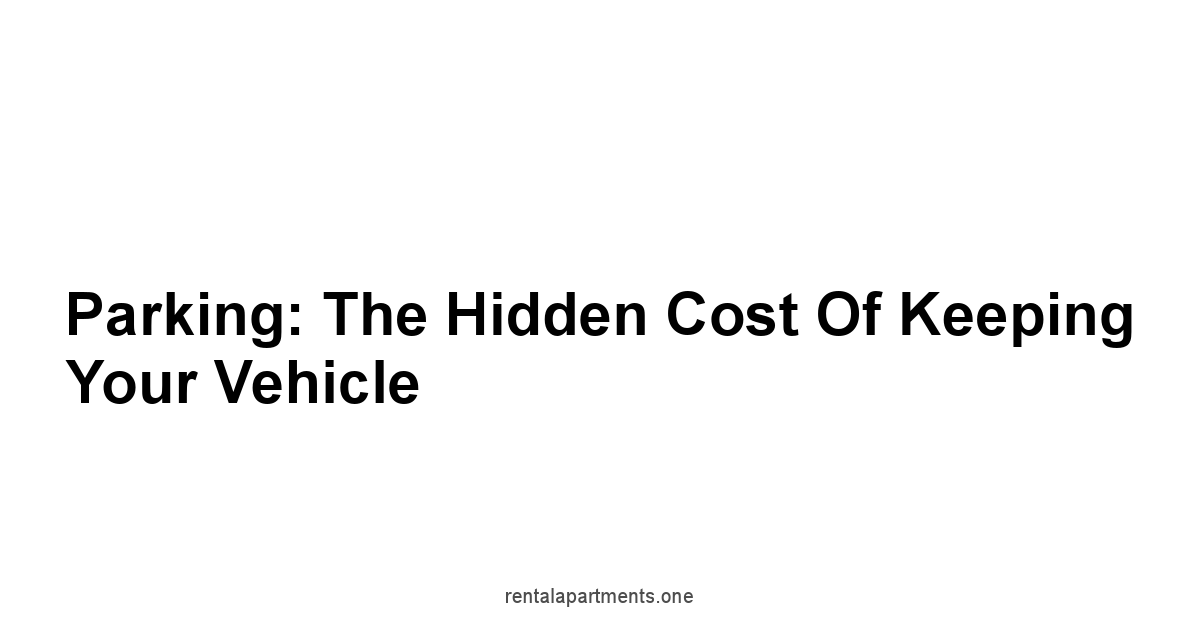
Parking, it’s something many renters take for granted, but it’s not always included in your rent.
Parking can be a headache, especially in urban areas.
The cost of parking can vary from place to place, and it’s something that you have to factor into your budget.
It’s important to know if you have to pay extra for parking, because that can increase the cost of renting.
Parking can also involve limited spots, street parking, and garage parking options, and all of those come with their own challenges.
It’s not just about finding a spot to park, it’s about the cost, convenience, and the restrictions that come with each option.
You have to be aware of these costs, so you don’t end up paying a higher amount every month.
This is something that is often overlooked until you need to park your car.
Assigned Spaces: The Cost of Convenience
Having an assigned parking space is convenient, but it also comes with a cost.
The convenience of having a guaranteed parking spot comes at a price, especially in high-demand areas.
These assigned spaces can add a substantial amount to your monthly costs, and they might not be an option for all renters. They vary in price based on your location.
Assigned spaces usually come at a premium and it is something you will have to pay for.
You might be paying for something that is not worth it if you don’t need parking. So it all depends on your specific situation.
But if you do have a car, and want to park it in a designated area, you should be prepared to pay extra.
If you live in an area with no street parking available, you have no option but to pay for an assigned spot.
- Convenience: Guaranteed parking spot
- Additional Cost: Can add to your monthly rent
- High-Demand Areas: More expensive
- Optional: May not be necessary for all renters
Street Parking: A Headache and Potentially Costly
Street parking can be a cost-effective option, but it comes with its own set of problems.
It’s not always easy to find a spot, and there are usually restrictions, such as time limits, street cleaning, or permit requirements.
If you end up parking illegally, you might have to pay fines and penalties, which could end up being more expensive than paying for assigned parking. You have to be very careful with street parking.
Street parking is not just about finding a spot.
You need to be aware of the local regulations and restrictions, which can be very complex.
Many street parking areas have restrictions that require certain permits, and if you don’t have those, you will get fined.
Also, you may not be able to park near your home if there are no available spots.
Street parking is free, but not always easy, so don’t depend on it.
- Cost-Effective: Generally free, but not always
- Challenges: Limited spots and restrictions
- Fines: Penalties for illegal parking
- Regulation: Check local parking laws
Garage Parking: An Additional Expense
Garage parking is another option that usually comes with extra costs, similar to assigned spaces.
It’s a convenient place to park, but it will come at a premium, and the costs can vary greatly.
Indoor parking has the benefit of protecting your car from the elements, and provides additional security, but is it worth the additional expense? You must decide that for yourself.
Garage parking is often more expensive than assigned spaces, and you will have to pay for it on top of your monthly rent.
It’s a convenience that can increase your monthly costs, but for some, it is something that they consider to be worth the expense.
Evaluate your options and choose the one that best fits your budget and needs.
This is a necessary expense to some but unnecessary to others.
- Expense: More expensive than assigned spots
- Convenience: Indoor parking with additional protection
- Security: Protection from the elements and theft
- Additional Cost: Adds to monthly expenses
Guest Parking: Be Ready for Restrictions
Guest parking is usually limited or restricted, especially in residential areas.
When you have guests over, they might not be able to find parking near your home, or if they do, they may be required to pay a fee.
This can be inconvenient, and you need to be prepared for that. The availability of guest parking can vary greatly.
It’s always good to know what to expect when you have guests.
The rules for guest parking vary based on location.
Some places don’t offer any guest parking and others do but with restrictions.
If your guests park in the wrong place, they might be towed, which is a hassle.
You need to make sure your guests are aware of the restrictions, so they don’t get into any trouble.
Always check before hand what options your guests have before they come over.
- Limited: Typically limited in most residential areas
- Restrictions: Time limits or permits may apply
- Towing: Illegally parked cars might get towed
- Guest Awareness:
Final Verdict
Renting is a game of costs, not just the listed rent.
It’s the application fees, credit checks, security deposits, and the moving truck rental.
It’s the boxes, the tape, the time you take off work, and the utility setups.
It’s the renter’s insurance, the pet fees, and the parking spot.
Each one of these adds up and eats into your wallet, sometimes slowly, sometimes quickly.
These hidden costs are not small, and they’re often the reason many renters struggle to stay afloat.
It’s a lot, and it can feel like the game is rigged against you.
The application fees can hit you before you’ve even secured a place.
The security deposit, equal to one or two months rent, a substantial amount of money that many renters struggle with.
Moving, a logistical nightmare of truck rentals, packing supplies, and time.
And, the first utility bills, always a surprise that can make your budget crumble.
The hidden costs are more than a small inconvenience, they represent real money that every renter needs to consider.
A recent study showed that on average renters spend 30% more than the advertised rent once all the hidden costs are factored in, this demonstrates how these costs add up.
Renter’s insurance, a necessity but too often overlooked, and it can protect you from financial ruin when disaster strikes.
Pet fees, a constant drain, and parking, a never ending search for convenience and affordability.
They’re costs you can’t ignore, they’re the reality of renting.
It’s about knowing what you are getting into and making the right choices, so you don’t end up broke.
A recent survey shows that nearly 60% of renters are unaware of all the costs involved in renting beyond the monthly rent, a clear indication that this is a problem.
The best you can do is to be aware, plan ahead, and always budget for more than you think you will need.
You need to research each one of these costs so that you know what to expect.
Knowing all these hidden costs is the first step in taking control of your finances and ensuring that renting doesn’t become a never-ending financial battle.
Be prepared, stay informed, and remember you are not alone in this process.
Every renter has to deal with these costs, and you can navigate this complex process too with the right knowledge and preparation.
Frequently Asked Questions
What are application fees, and why do I have to pay them?
They want to know about you before they give you a place, your history, if you make enough money.
The application fees are the cost of doing that business, for them.
You have to pay them for them to consider you, and they don’t go towards your rent or deposit.
How much can application fees cost?
Application fees are not the same everywhere. They can be from $25 to $100, or even more.
It depends on where you’re trying to rent, the market.
What are credit check fees, and are they always separate from application fees?
Landlords want to know if you pay your bills on time, so they do a credit check, and they charge you for it.
Sometimes, it’s included in the application fee, but sometimes, it’s separate. It can cost you an additional $20-$50.
Why do I need to apply to multiple places?
The rental market is tough, sometimes you have to apply to multiple places to get one. But be smart about it.
Every time you apply you are paying a fee, so apply for places that you really want and you know you might get.
What is a security deposit, and how much is it?
The security deposit is the money you give to the landlord upfront. It’s supposed to cover any damages you cause.
It can be equal to one or two months’ rent, or more. It’s a big expense.
What can a landlord deduct from my security deposit?
The landlord can deduct for any damages that go beyond normal wear and tear.
They may charge you for holes in the wall, stains, broken fixtures or even excessive cleaning. Always document everything when you move in.
How can I make sure I get my security deposit back?
Document everything when you move in, photos and videos.
Keep records, negotiate with the landlord, and know your rights. Sometimes it’s a battle, but it’s worth it.
What is a walk-through checklist, and why do I need one?
The walk-through checklist is an inventory of the condition of the rental when you move in.
It’s your evidence if there is a dispute when you move out. It’s very important to protect your deposit.
What are the typical moving expenses I should consider?
Moving is not cheap. Truck rental, boxes, tape, moving labor. Time you spend packing is also money you have lost. Don’t underestimate those costs.
How much does a moving truck cost?
It depends on the size of the truck, and the distance you are moving. One-way rentals are more expensive than local. Don’t forget the mileage, insurance, and gas.
How can I save money on packing materials?
Find free boxes at grocery stores, or online. Gather boxes ahead of time.
Don’t wait till the last minute to buy new boxes at retail prices.
Why is my time a moving expense?
Time you spend moving, is time you are not working or doing something else.
If you take time off work, that costs you lost wages. Always factor that in.
Are professional movers worth the cost?
They cost more, but they save you time and effort.
If you have a lot of stuff and a long distance move, it might be worth it.
Compare prices and reviews from multiple companies, before choosing.
What utility costs should I expect?
You need electricity, gas, water, and sometimes trash.
There can be deposits, setup fees, and variable costs depending on your consumption and the area you are living in.
How can I avoid a shock when I get my first utility bills?
Budget for higher costs.
The first bills are difficult to predict, so over estimate those costs, and keep an eye on your consumption.
What is a utility deposit?
Utility companies may ask for a deposit when you set up your services, especially if you are a first time user.
It’s a security for them if you don’t pay your bills.
What are the late fees for utilities?
If you pay your bills late, they will charge you extra. Those fees can add up. Always set up automatic payments to avoid this.
What is renter’s insurance, and why do I need it?
It is a layer of protection that protects your belongings. Your landlord’s insurance only covers the building.
You need renter’s insurance to cover your stuff, in case of theft, fire, water damage, and other disasters.
What kind of coverage should I look for in a renter’s insurance policy?
Make sure you are covered for theft, fire, and water damage, and that it protects you from liability.
There are two types, actual cash value or replacement cost. Choose based on your needs and budget.
What is a deductible in renter’s insurance?
It’s the amount you will pay before your insurance policy pays the rest. Choose wisely.
If you have a higher deductible, your premium will be lower, and vice versa.
Is renter’s insurance worth the cost?
Yes, it’s a must. It is cheaper than replacing everything you own. Don’t gamble on not getting insurance.
What are pet fees, and why do landlords charge them?
Landlords charge extra for pets because of noise, damages, and potential cleaning. It’s just business for them.
What is a pet deposit and is it refundable?
A pet deposit is an upfront fee you pay for your pet.
It is not the same as a security deposit, and it is usually non-refundable.
What is monthly pet rent?
It is an additional recurring expense that you have to deal with each month. It is paid on top of your monthly rent.
Can landlords restrict certain pet breeds?
Yes, landlords can restrict certain pet breeds, based on safety and insurance policies. Check with your landlord before you apply.
What happens if my pet causes damages?
You are responsible for the damages caused by your pet.
They can be deducted from your security deposit or pet deposit.
Is parking always included in rent?
No, not always. Parking can be an additional expense.
You might have to pay for an assigned spot or street parking.
What are the costs of an assigned parking spot?
Assigned parking spots are convenient, but they can add to your monthly rent. The costs vary based on the location.
Is street parking always free?
No, it is not always free.
There are time limits, street cleaning rules and permit requirements. You might get a fine if you park illegally.
Is garage parking more expensive than assigned parking?
Yes.
Garage parking is usually more expensive because it provides protection from the elements and additional security.
What about parking for my guests?
Guest parking is often limited, restricted, or they might have to pay for it. Always check the rules before your guests arrive.




